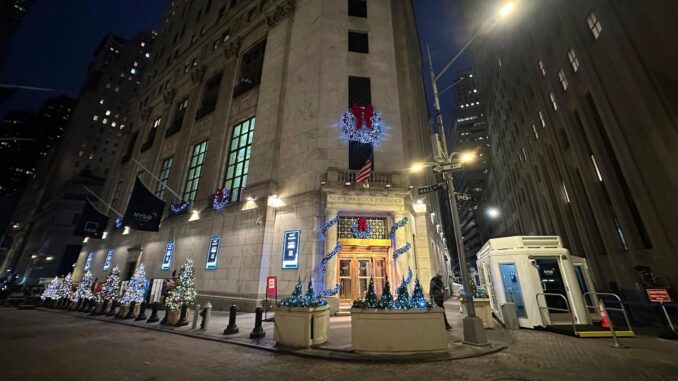
NEW YORK — U.S. stocks are hanging around their records ahead of a big jobs report due on Friday. The crypto market had much more action, and bitcoin burst to a record above $103,000. The S&P 500 was flat early Thursday after setting an all-time high for the 56th time this year the day before. The Dow Jones Industrial Average slipped 34 points, while the Nasdaq composite rose 0.1%. Bitcoin powered above $100,000 the night before after President-elect Donald Trump chose a crypto advocate, Paul Atkins, as his nominee to head the Securities and Exchange Commission. The cryptocurrency has climbed dramatically since Election Day.
THIS IS A BREAKING NEWS UPDATE. AP’s earlier story follows below.
U.S. markets were quiet early Thursday following another record rally on Wall Street, while bitcoin surged above $100,000 for the first time.
Futures for the S&P 500 and Dow Jones Industrial Average were each down less than 0.1% before the bell.
Bitcoin powered above $100,000 late Wednesday, U.S. time, after President-elect Donald Trump chose crypto advocate Paul Atkins as his nominee to head the Securities and Exchange Commission. The cryptocurrency has climbed dramatically from $69,374 on Nov. 5, Election Day.
Early Thursday, it was trading at $102,826, according to CoinDesk.
In equities trading early Thursday, discount retailer Five Below jumped more than 14% after the Philadelphia company trounced Wall Street’s third-quarter sales and profit forecasts. It’s quite the turnaround from July, when Five Below slashed guidance and announced that its CEO and President Joel Anderson had stepped down amid languishing sales.
Dollar General, another discount retailer, gained close to 2% in premarket after it topped sales projections but missed on Wall Street’s per-share profit targets.
Fashion retailer American Eagle fell 13.7% after it beat profit targets but disappointed investors with tepid guidance and warnings of potentially sluggish sales during non-peak periods lacking a major holiday.
Elsewhere, in Europe at midday France’s CAC 40 ticked up just 0.1% in early trading after the country’s far-right and left-wing lawmakers joined together to vote on a no-confidence motion prompted by budget disputes that will force Prime Minister Michel Barnier and his Cabinet to resign.
Germany’s DAX rose 0.3% while Britain’s FTSE 100 was unchanged.
In Asian trading, South Korea’s Kospi fell 0.9% to 2,441.85, extending a 1.4% decline the day before as President Yoon Suk Yeol was facing possible impeachment after he suddenly declared martial law on Tuesday night. He revoked the martial law declaration six hours later.
Yoon accepted his defense minister’s resignation Thursday as opposition parties moved to impeach them both. The main opposition Democratic Party and other small opposition parties submitted a joint motion to impeach President Yoon Suk Yeol on Wednesday over his martial law declaration.
Japan’s benchmark Nikkei 225 added 0.3% to finish at 39,395.60, while Australia’s S&P/ASX 200 gained 0.2% to 8,474.90. Hong Kong’s Hang Seng slipped 0.9% to 19,560.44. The Shanghai Composite gained 0.1% to 3,368.86.
Taiwan’s Taiex gained nearly 0.1%, while the Sensex in India was up 0.9%.
This week’s highlight for Wall Street will be Friday’s jobs report from the U.S. government, which will show how many people employers hired and fired last month.
Expectations are brewing that the Fed will cut its main interest rate again when it meets in two weeks. The Fed began easing its main interest rate from a two-decade high in September, hoping to offer more support for the job market.
The central bank had appeared set to continue cutting rates into next year, but the election of Donald Trump has scrambled Wall Street’s expectations somewhat. Trump’s preference for higher tariffs and other policies could lead to higher inflation, which could alter the Fed’s plans.
In energy trading, benchmark U.S. crude added 24 cents to $68.78 a barrel. Brent crude, the international standard, also rose 24 cents, to $72.55 a barrel.
The OPEC+ alliance of oil exporting countries will decide Thursday whether to put off plans to pump more crude amid sluggish demand and competing production from non-allied countries — factors that could keep oil prices stagnant into next year.
Key beneficiaries of that would be U.S. motorists, who have seen gasoline prices fall to their lowest in 2 1/2 years to near $3 a gallon.
In currency trading, the U.S. dollar fell to 150.43 Japanese yen from 150.62 yen. The euro cost $1.0534, inching up from $1.0510.


Be the first to comment